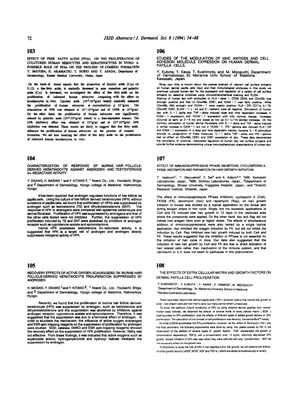Characterization of Response of Murine Hair Follicle-Derived Keratinocytes Against Androgen and Testosterone 5α-Reductase Activity
August 1994
in “
Journal of dermatological science
”
androgens testosterone dihydrotestosterone DHT hair follicle-derived keratinocytes HFKs androgen receptor cyproterone acetate spironolactone testosterone 5α-reductase epidermal keratinocytes dermal fibroblasts androgens testosterone DHT hair follicle cells androgen receptor cyproterone acetate spironolactone testosterone 5α-reductase skin cells fibroblasts

TLDR Mouse hair cells respond to male hormones by growing less, and this can be stopped by certain blockers.
The document reports on a study that investigated the response of murine hair follicle-derived keratinocytes (HFKs) to androgens such as testosterone (TE) and dihydrotestosterone (DHT). The study found that the proliferation of HFKs was suppressed by these androgens, a response that was not observed in epidermal keratinocytes or dermal fibroblasts. Additionally, the suppression of HFK proliferation by TE and DHT could be abolished by inhibitors of the androgen receptor, such as cyproterone acetate and spironolactone. This suggests that HFKs possess testosterone 5α-reductase activity and are direct targets of androgen, which suppresses their mitogenic activity. The number of participants or samples used in the study was not provided in the summary.


